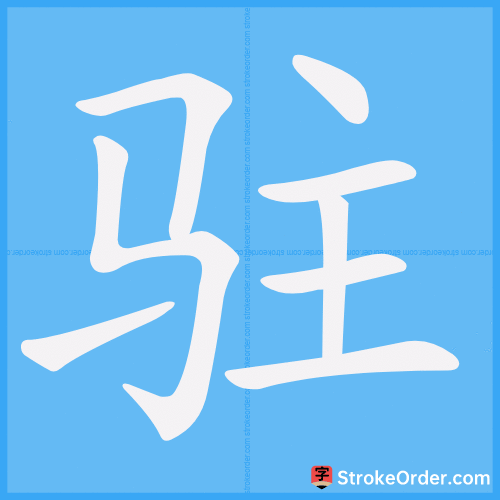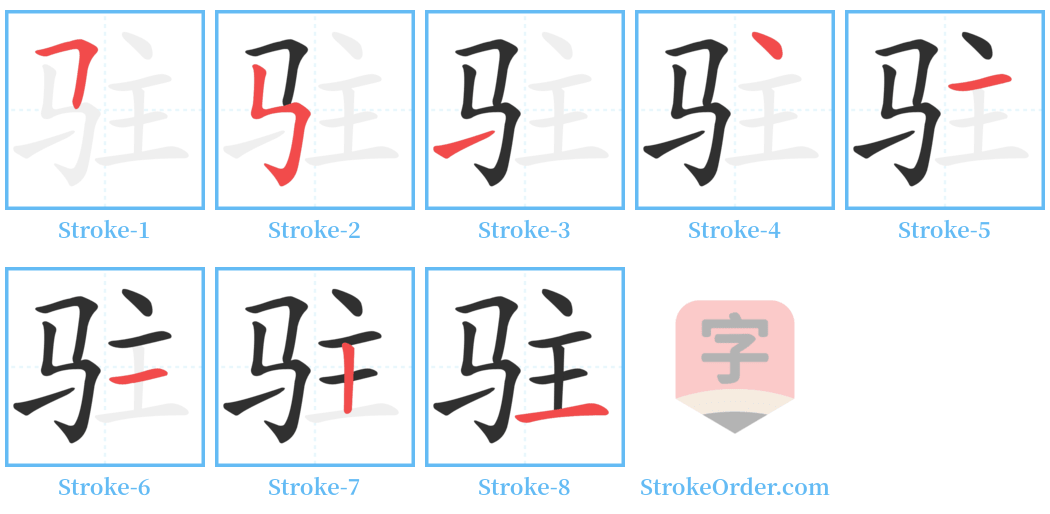驻 Stroke Order
Animated Stroke Order of 驻

Stroke Order Diagrams for 驻

Step-by-Step Handwriting Guide for 驻

Learn to Write Chinese Characters with Video Tutorials
Watch the video of writing the Chinese character "驻", learn the correct stroke order (笔顺) of the character "驻", and master the standard way of writing the character "驻".
Free Printable Handwriting Practice with Stroke Order: 驻
Printable Writing Practice Worksheet of "驻" in Portrait Orientation (Tian Zi Ge)

Printable Writing Practice Worksheet of "驻" in Landscape Orientation (Tian Zi Ge)

Information of 驻
Pinyin
zhù
Radical
马
Strokes
8 strokes
Usage
★★★★★
Definition
resident in / stationed in / located at / to station (troops)
驻 (zhù)
Definition:
1. To stay in one place.
2. Troops or external staff live at the place where they perform their duties; an agency dispatched by a department or unit is located in a certain place.
Meanings:
1. To stay in one place: 兵驻足 (troops halt); 驻颜 (to stay youthful).
2. Troops or external staff living where they perform duties; an agency sent by a department/unit to a certain location: 驻扎 (be stationed); 驻守 (stay in place); 驻防 (station for defense); 驻外使节 (ambassadors stationed abroad).
Original meaning:
馬立止 (horse halts)
Variations:
1. Same as the original meaning (horse halts).
2. In ancient times, it specifically referred to a carriage stopping or standing still.
3. To stay; to halt.
4. To be stationed.
5. To remain; to reside; to stay.
6. To ask someone to stay; to keep someone where they are.
Examples:
1. As seen in: 驻马 (to stop a horse), 驻鞍 (to halt a saddle), 驻勒 (to stop rein).
2. In ancient times, specifically referred to a carriage stopping: 驻驾庑 (carriage shed); 驻盖 (to stop a carriage).
3. To halt or stay: 行人驻足听 (the passerby stops to listen).
4. Troops stationed: 进驻 (troops advance and settle), 驻泊 (to temporarily dock a ship).
5. To stay in a place: 驻使 (ambassadors stationed abroad), 驻锡 (monks residing in temples).
6. To maintain presence: 驻春 (to hold onto spring), 驻颜 (to preserve one's appearance).
the emperor's lodging when traveling / emperor's stopover place during journey / stay temporarily / stop over / put up
to dispatch (sb) in an official capacity / to be posted (as an ambassador, foreign correspondent etc)
Input Method for 驻
Pinyin
zhu4
Wubi
cygg|cgyg
Cangjie
nmyg
Zhengma
xsc
Four Corner
70114
Unicode
U+9a7b
Same Pronunciation Characters